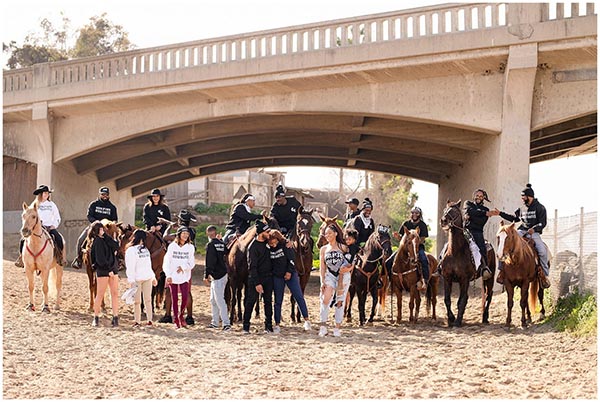The Compton Cowboys
The streets raised us. Horses saved us.
By: Brittany Bevis
Straight outta Richland Farms, in an area better known for gangster rap and gun violence than it is for stables and horses, a group of determined, black riders is blazing a new trail. They are the Compton Cowboys.
“My auntie, Mayisha Akbar, started the non profit in 1988 that was originally called the Compton Junior Posse and has now been rebranded as Compton Junior Equestrian,” says 29-year-old Randy Savvy, founding member of the Compton Cowboys. “She retired in November after some 30 years of service to the community. All of the group members in the Compton Cowboys, nine guys and one female, are alumni of the program and took it upon ourselves to take on the leadership and management of the organization.”
Randy’s aunt grew up in Harbor City, California and had experience with horses as a child. But, it wasn’t until her professional career in real estate took her to Compton did she rediscover her roots with a unique property in the heart of the city.
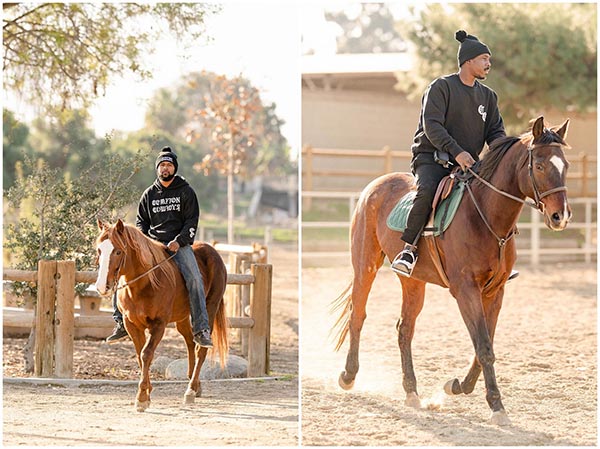 “She had horses in her spirit,” Randy says. “She stumbled across this neighborhood in Compton that became Richland Farms. The people in town had horses right in the middle of the city, and she was excited to move here and get back into that lifestyle. As time went on, she noticed how much of a negative influence the street life had on the kids in Compton. Around that time, it was the late 80s and early 90s. It was a crazy time with the Rodney King stuff happening and the crack epidemic in the local community and inner city. Eventually, her son was shot due to gang related violence.”
“She had horses in her spirit,” Randy says. “She stumbled across this neighborhood in Compton that became Richland Farms. The people in town had horses right in the middle of the city, and she was excited to move here and get back into that lifestyle. As time went on, she noticed how much of a negative influence the street life had on the kids in Compton. Around that time, it was the late 80s and early 90s. It was a crazy time with the Rodney King stuff happening and the crack epidemic in the local community and inner city. Eventually, her son was shot due to gang related violence.”
“She started thinking about what she was going to do for the safety of our family. Did she want to leave and take her family away to ensure their safety? Or did she want to stay and make a difference? She chose the latter. She didn’t want to be one of those folks that you see all too often. The black, affluent members of society usually end up leaving for nicer, safer places and leave behind all the negative influences, creating a never ending cycle of BS. She didn’t want to abandon her community.”
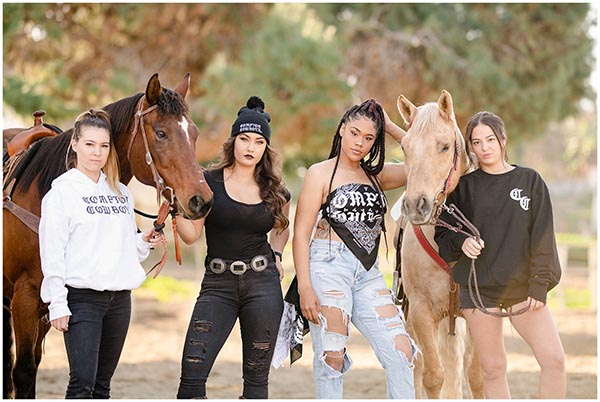 It was during a trail ride aboard one of her horses along the Compton streets when Mayisha had a lightbulb moment. “Every time she was riding a horse, all the kids in the neighborhood would come knocking on the door to ask us if they could ride too. So, she thought that the horses would attract the kids and, if they wanted to come ride, then she could teach them about life and have a positive influence on them.”
It was during a trail ride aboard one of her horses along the Compton streets when Mayisha had a lightbulb moment. “Every time she was riding a horse, all the kids in the neighborhood would come knocking on the door to ask us if they could ride too. So, she thought that the horses would attract the kids and, if they wanted to come ride, then she could teach them about life and have a positive influence on them.”
That was the beginning of the Compton Junior Posse.
If neighborhood kids wanted to ride, Mayisha had a few rules. First, they had to bring along a parent or guardian. Second, Mayisha wanted to be sure they were going to school, so a report card was required. Finally, kids must participate in all tasks around the barn such as cleaning stalls, washing horses, and tacking up. The next thing she knew, one kid turned into a dozen and blossomed into the program we see today.
“We have a full scale ranch that has been created by combining three adjacent properties to create a ranch environment. We have 12 horses in the program, which helps introduce kids to the equine industry and also offers a safe space and positive role models.”
“We have kids from 10 to 18, and it’s a wide spectrum of abilities. Some local kids have zero experience with horses, while some kids have already been riding horses and are just looking for a club to join. Our target demographic is at-risk youth that need an alternative option for a better life.”
The CJE purposefully keeps their program small to provide the kids with as much individual attention as possible. Training begins with the fundamentals of riding with bareback instruction and horsemanship and then progresses into the introduction of all the major disciplines.
“The goal is that once the kids become part of the program, we want to introduce them to all the disciplines to let them choose, whether that’s rodeo, trail riding, leisure riding, Hunter/Jumper, Dressage, Polo, or racing, anything they can make a profession out of. We have the support of several top athletes in the industry, like the 2008 Olympic Gold medalist in Show Jumping, Will Simpson, and one of our own, Professional Bareback Rider, Tre Hosely.”
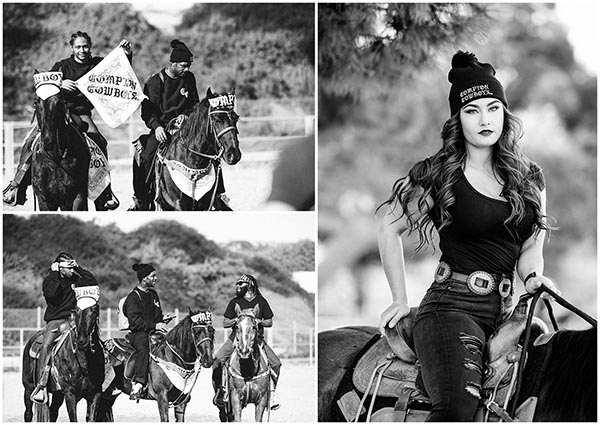 Ultimately, Randy would like to see the CJE be able to produce top level equestrian athletes and expand their program to other inner city communities across the country. “I’d love to be able to get the ranch in a place that it can sustain itself financially with a good business model and be able to get these kids college scholarships. We’d like to use the same model in different inner cities in the country, and even around the world, where there is such a lack of nature. If we could get our club to a place where it could produce an Olympic athlete or have one of our kids become a pro rodeo rider or even an equine therapist, we’d love to be able to create the next generation of really high level, equine professionals.”
Ultimately, Randy would like to see the CJE be able to produce top level equestrian athletes and expand their program to other inner city communities across the country. “I’d love to be able to get the ranch in a place that it can sustain itself financially with a good business model and be able to get these kids college scholarships. We’d like to use the same model in different inner cities in the country, and even around the world, where there is such a lack of nature. If we could get our club to a place where it could produce an Olympic athlete or have one of our kids become a pro rodeo rider or even an equine therapist, we’d love to be able to create the next generation of really high level, equine professionals.”
As the face of the CJE, the Compton Cowboys are doing their part by helping to raise awareness and funds via their work in entertainment and media campaigns, photo shoots, editorial spreads, television, fashion, modeling, and music.
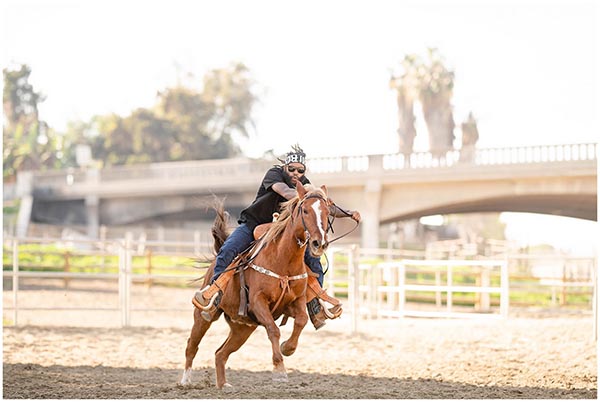 “It’s a way to make a living as a talent group, but it’s also a creative way of fundraising for our non profit. It’s a way to tell a story through entertainment and media and to raise awareness and funding for our program.”
“It’s a way to make a living as a talent group, but it’s also a creative way of fundraising for our non profit. It’s a way to tell a story through entertainment and media and to raise awareness and funding for our program.”
That’s exactly what happened when Guinness Beer came calling. “The marketing team for Guinness, which is based in Ireland, had a vision of doing something edgy with black cowboys here in the US. They were searching for cowboys in Los Angeles and came across the Compton Cowboys.” The resulting mini docu-series tells the story of the Compton Cowboys, as well as the many rescue horses that are used to teach children in the club.
Randy’s own personal horse is a Tennessee Walker named Fury. While Randy was a champion Barrel Racer during his youth, these days he prefers a relaxing trail ride with his best friend.
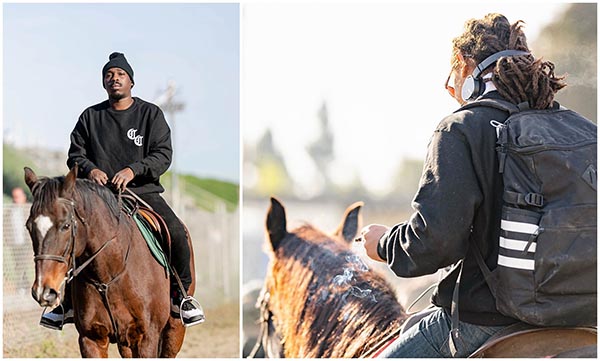 “My work environment is so hectic. Being on the ranch with my horse brings me back in touch with the simple things in life, like heat beat and oxygen. To me, my horse is more like therapy. Some people go to the spa. I go to the barn. Also, my horse is my friend. When I’m riding, it’s like a freedom. It makes you feel in touch with the earth.”
“My work environment is so hectic. Being on the ranch with my horse brings me back in touch with the simple things in life, like heat beat and oxygen. To me, my horse is more like therapy. Some people go to the spa. I go to the barn. Also, my horse is my friend. When I’m riding, it’s like a freedom. It makes you feel in touch with the earth.”
“The main thing is that living in a modern society, especially in a city, we are overwhelmed by things that are man made: cars, freeways, offices, apartments, buildings. You start losing touch and being in tune with the simple, natural things. Horses keep me balanced.”
Donations help to ensure the future of Compton Junior Equestrian and their mission, click here to learn more- www.comptonjrequestrian.org










